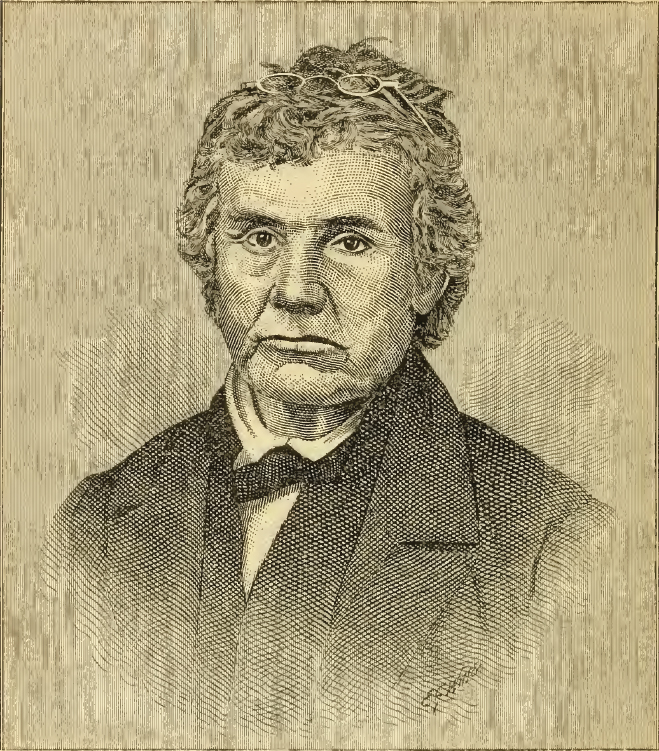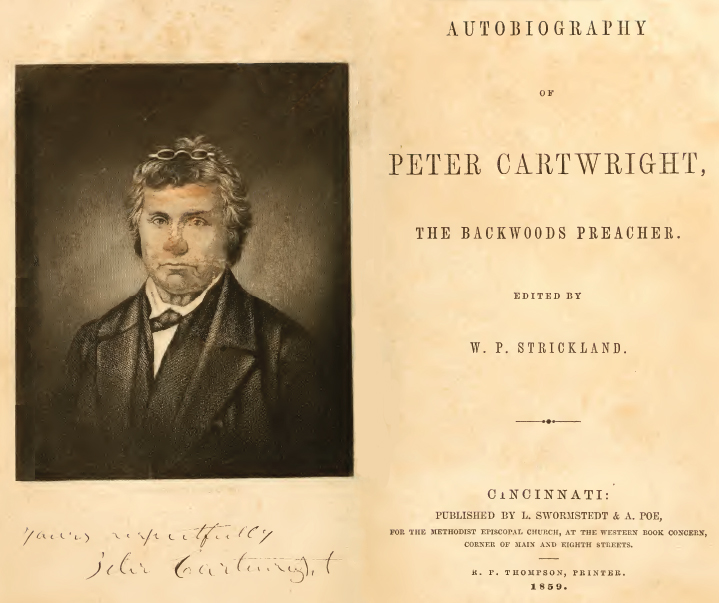Peter Cartwright
(1785-1872)
![]()
Methodist Minister
The Second Great Awakening in America's religious history began in southern Logan county, Kentucky. The presbyterian minister James McGready (1763-1817) instigated the movement during the summer of 1800 with several campmeetings. He preached mainly in three different parts of the county, on Red River, on Gasper River, and On Mud River (sometimes referred to as Muddy River). All three original meetinghouses are no longer extant, but a replica sits at the old Red River location.
Peter Cartwright was born in Amherst County, present-day Nelson County, Virginia on September 1, 1785. When a small lad, his family moved to Kentucky and settled on Red River in south Logan County. In his youth, he got religion while attending meetings at the Red River Meetinghouse, not far from his home. In a few years he was ordained in the Methodist faith as a circuit-riding minister. He was known as the "Backwoods Preacher," and several other monikers.
He spent the later part of his life in Sangamon County, Illinois. He was involved in politics for a while, and even lost in a congressional bid against the young lawyer, Abraham Lincoln. He died at Pleasant Plains, Sangamon County, Illinois, September 25, 1872, at the age of 87, and was buried in the Pleasant Plains Cemetery.
As this website is dedicated to the history of the Restoration Movement, there may be question as to why Cartwright is being considered or added to this website. However, though a Methodist, his roots in the Second Great Awakening make him worthy of identifying. A great contribution he provides for the historian is the first several chapters in his Autobiography that tells about the Revival, and the surrounding history and mood of the people at the time of the Great Awakening. Below is a transcript of the Preface and first five chapters from his Autobiography.
Further down the page are several photographs recently taken of Peter Cartwright's childhood home in south Logan County, Kentucky. Presently, it is in a most delapidated state. Unless someone of means undertakes a restoration project of the old homeplace, it will soon be completely gone for the ages. A historical marker stands upon the main road nearby.
![]()
Autobiography of Peter Cartwright
The Backwoods Preacher
ed. W. P. Strickland,
Cincinnati:
Published By L. Swormstedt & A. Poe
For the Methodist Episcopal Church, At the Western Book Concern,
Corner of Main and Eighth Streets.
R.P. Thompson, Printer
1859
PREFACE.
For many years past, and especially during the last ten or twelve, I have been almost unceasingly importuned to write out a history of my life, as one among the oldest Methodist traveling preachers west of the mountains. This would necessarily connect with it a history of the rise and progress of the Methodist Episcopal Church in the great valley of the Mississippi. And surely a work of this kind, written by a competent historiographer, who had kept himself posted, or had kept a journal of his life, and the many thrilling incidents connected with the history of the Church, or the life of a pioneer traveling preacher, could not fail to interest the Church and many of her friends, and would rescue from oblivion many, very many, incidents that are now lost, and gone forever beyond the reach of the historian’s pen.
I have regretted through life that some of my contemporaries, who were much better qualified for the task than I am, did not write out such a work as is contemplated in this imperfect sketch. Had I seriously thought of sending such a work into the world, I should have tried hard to have been better prepared. But it must be remembered that many of us early traveling preachers, who entered the vast wilderness of the west at an early day, had little or no education; no books, and no time to read or study them if we could have had them. We had no colleges, nor even a respectable common school, within hundreds of miles of us. Old Dyke or Dilworth was our spelling book; and what little we did learn, as we grew up, and the means of education increased among us, we found, to our hearts' content, that we had to unlearn, and this was the hardest work of all.
And now that I am old and well stricken in years, it has been, and is, my abiding conviction, that I can not write a book that will be respectable, or one that will be worth reading; but I have reluctantly yielded to the many solicitations of my friends, and I am conscious that there must be many imperfections and inaccuracies in the work. I have no books to guide me; my memory is greatly at fault; ten thousand interesting facts have escaped my recollection; names and places have passed from me which can not be recalled and I fear that many scenes and incidents, as they now occur to my recollection, will be added to, or diminished from.
Moreover, as I well understand that I have been considered constitutionally an eccentric minister, thousands of the thrilling incidents that have gained publicity, and have been attributed to me, when they are not found in my book will create disappointment. But I trust their place will be supplied by a true version; and though some of them may not be as marvelous, may nevertheless be quite as interesting. I have many to record that have not seen the light, which will be quite as thrilling as any that have been narrated, and their truthfulness will make them more so.
Some of our beloved bishops, book agents, editors, and old men, preachers and private members, as well as a host of our young, strong men and ministers, who are now actively engaged in building up the Church, have urged me to undertake this sketch of my life, and I have not felt at liberty to decline, but send it out with all its imperfections, hoping that it may in some way, and
to some extent, conduce to the interests of the Redeemer's kingdom, and do more than merely gratify an idle curiosity, or offend the fastidious taste of some of our present more highly-favored and better educated ministers, who enjoy the many glorious advantages of books, a better education, and improved state of society, from which we, as early pioneers, were almost wholly excluded.
Right here I wish to say—I hope without the charge of egotism—when I consider the insurmountable disadvantages and difficulties that the early pioneer Methodist preachers labored under in spreading the Gospel in these Western wilds in the great valley of the Mississippi, and contrast the disabilities which surrounded them on every hand, with the glorious human advantages that are enjoyed by their present successors, it is confoundingly miraculous to me that our modern preachers cannot preach better, and do more good than they do. Many nights, in early times, the itinerant had to camp out, without fire or food for man or beast. Our pocket Bible, Hymn Book, and Discipline constituted our library. It is true we could not, many or us, conjugate a verb or parse a sentence, and murdered the king’s English almost every lick. But there was a Divine unction attended the word preached, and thousands fell under the mighty power of God, and thus the Methodist Episcopal Church was planted firmly in this Western wilderness, and many glorious signs have followed, and will follow, to the end of time.
I will here state, that, at an early period of my ministry, I commenced keeping a journal, and kept it up for several years, till at length several of our early missionaries to the Natchez country returned, and many of them, I found, were keeping a journal of their lives and labors, and it seemed to me we were outdoing the thing, and under this conviction I threw my manuscript journals to the moles and bats. This act of my life I have deeply regretted, for if I had persisted in journalizing, I could now avail myself of many interesting facts, dates, names, and circumstances that would greatly aid me in my sketch.
I know it is impossible for my friends to realize the embarrassments I labor under, for the want of some safe guide to my failing and treacherous memory. I therefore ask great indulgence from any and all who may chance to read this imperfect sketch, and pray that our kind Savior may forgive any inaccuracies or errors that it may contain. If I had my ministerial life to live over again, my present conviction is that I would scrupulously keep a journal. But this can not be; therefore I must submit.
And now, in the conclusion of this introduction, I will say, I ask forgiveness of God for all the errors of this work, and all the errors of my whole life, especially of my ministerial life. I also ask for the forgiveness of the Methodist Episcopal Church, as one of her unworthy ministers, for any wrongs I may have done to her, or to the world.
I also most sincerely ask the prayers of the Church, that while my sun is fast declining, and must soon set to rise on earth no more, I may have a peaceful and happy end, and that I may meet any that I may have been the instrument of doing good to, with all my dear brethren, safe in heaven, to praise God together forever. Amen.
Peter Cartwright.
Pleasant Plains, Ill., 1856.
Chapter One
Autobiography
of
Peter Cartwright
Chapter I
Parentage.
I was born September 1st, 1785, in Amherst County, on James River, in the State of Virginia. My parents were poor. My father was a soldier in the great struggle for liberty, in the Revolutionary war with Great Britain. He served over two years. My mother was an orphan. Shortly after the united colonies gained their independence, my parents moved to Kentucky, which was a new country. It was an almost unbroken wilderness from Virginia to Kentucky at that early day, and this wilderness was filled with thousands of hostile Indians, and many thousands of the emigrants to Kentucky lost their lives by these savages. There were no roads for carriages at that time, and although the emigrants moved by thousands, they had to move on pack horses. Many adventurous young men went to this new country. The fall my father moved, there were a great many families who joined together for mutual safety, and started for Kentucky. Besides the two hundred families thus united, there were one hundred young men, well armed, who agreed to guard these families through, and, as a compensation, they were to be supported for their services. After we struck the wilderness we rarely traveled a day but we passed some white persons, murdered and scalped by the Indians while going to or returning from Kentucky. We traveled on till Sunday, and, instead of resting that day, the voice of the company was to move on.
It was a dark, cloudy day, misty with rain. Many Indians were seen through the day skulking round by our guards. Late in the evening we came to what was called "Camp Defeat," where a number of emigrant families had been all murdered by the savages a short time before. Here the company called a halt to camp for the night. It was a solemn, gloomy time; every heart quaked with fear.
Soon the captain of our young men's company placed his men as sentinels all round the encampment. The stock and the women and children were placed in the center of the encampment. Most of the men that were heads of families, were placed around outside of the women and children. Those who were not placed in this position, were ordered to take their stand outside still, in the edge of the brush. It was a dark, dismal night, and all expected an attack from the Indians.
That night my father was placed as a sentinel, with a good rifle, in the edge of the brush. Shortly after he took his stand, and all was quiet in the camp, he thought he heard something moving toward him, and grunting like a swine. He knew there was no swine with the moving company, but it was so dark he could not see what it was. Presently he perceived a dark object in the distance, but nearer him than at first, and believing it to be an Indian, aiming to spring upon him and murder him in the dark, he leveled his rifle, and aimed at the dark lump as well as he could, and fired. He soon found he had hit the object, for it flounced about at a terrible rate, and my father gathered himself up and ran into camp.
When his gun fired there was an awful screaming throughout the encampment by the women and children. My father was soon inquired of as to what was the matter. He told them the circumstances of the case, but some said he was scared and wanted an excuse to come in; but he affirmed that there was no mistake, that there was something, and he had shot it; and if they would get a light and go with him, if he did not show them something, then they might call him a coward forever. They got a light and went to the place, and there they found an Indian, with a rifle in one hand and a tomahawk in the other, dead. My father's rifle-ball had struck the Indian nearly central in the head.
There was but little sleeping in the camp that night. However, the night passed away without any further alarms, and many glad hearts hailed the dawn of a new day. The next morning, as soon as the company could pack up, they started on their journey.
In a few days after this we met a lone man, who said his name was Baker, with his mouth bleeding at a desperate rate, having been shot by an Indian. Several of his teeth and his jaw-bone were broken by a ball from the Indian's gun. His account of a battle with the Indians was substantially as follows:
There were seven young white men returning to Virginia from Kentucky, all well armed; one of them, a Frenchman, had a considerable sum of money with him. All seven were mounted on fine horses, and they were waylaid by seven Indians.
When the white men approached near the ambush they were fired on by the Indians, and three shot down; the other four dismounted and shot down three of the Indians. At the second fire of the Indians two more of the white men fell, and at the second fire of the white men two more of the Indians fell. Then there were two and two. At the third fire of the Indians, Baker's only remaining companion fell, and he received the wound in the mouth. Thinking his chance a bad one, he wheeled and ran, loading his gun as he went. Finding a large, hollow tree, he crept into it, feet foremost, holding his rifle ready cocked, expecting them to look in, when he intended to fire. He heard the Indians cross and recross the log twice, but they did not look in.
At this perilous moment he heard the large cow bell that was on one of the drove of cattle of our company, and shortly after he crawled out of the log, and made his way to us, the happiest man I think I ever saw. Our company of young men rushed to the battle-ground, and found the dead white men and Indians, and dug two separate graves, and buried them where they fell. They got all the horses and clothes of the white men slain, and the Frenchman's money, for the surviving Indians had not time to scalp or strip them.
When we came within seven miles of the Crab Orchard, where there were a fort and the first white settlement, it was nearly night. We halted, and a vote was taken whether we should go on to the fort, or camp there for the night. Indians had been seen in our rear through the day. All wanted to go through except seven families, who refused to go any further that night. The main body went on, but they, the seven families, carelessly stripped off their clothes, laid down without any guards, and went to sleep.
Some time in the night about twenty-five Indians rushed on them, and every one, men, women, and children, was slain, except one man, who sprang from his bed and ran into the fort, barefooted and in his night-clothes. He brought the melancholy news of the slaughter.
The captain of the fort was an old, experienced ranger and Indian warrior. These murderous bands of savages lived north of the Ohio river, and would cross over into Kentucky, kill and steal, and then recross the Ohio into their own country. The old captain knew the country well, and the places of their crossing the river. Early next morning he called for volunteers, mounted men, and said he could get ahead of them. A goodly company turned out, and, sure enough, they got ahead of the Indians, and formed an ambush for them. Soon they saw the Indians coming, and, at a given signal, the whites fired on them. At the first shot all were killed but three; these were pursued, two of them killed, and but one made his escape to tell the sad news. All the plunder of the murdered families was retaken.
Thus you see what perilous times the first settlers had to reach that new and beautiful country of “canes and turkeys.”
Kentucky was claimed by no particular tribe of Indians, but was regarded as a common hunting-ground by the various tribes, east, west, north, and south. It abounded in various valuable game, such as buffalo, elk, bear, deer, turkeys, and many other smaller game, and hence the Indians struggled hard to keep the white people from taking possession of it. Many hard and bloody battles were fought, and thousands killed on both sides; and rightly was it named the “land of blood.” But finally the Indians were overpowered and driven off, and the white man obtained a peaceable and quiet possession.
It was chiefly settled by Virginians, as noble and brave a race of men and women as ever drew the breath of life. But Kentucky was far in the interior, and very distant from the Atlantic shores; and though a part of the great Mississippi Valley, the mouth of the Mississippi and thousands of miles up this “father of waters” belonged to foreign, and, in some sense, hostile nations, that were not very friendly to the new republic.
The Kentuckians labored under many, very many, disadvantages and privations; and had it not been for the fertility of the soil and the abundance of wild meat, they must have suffered beyond endurance. But the country soon filled up, and entered into the enjoyment of improved and civilized life.
Chapter II
Early Life.
After my father reached Kentucky he rented a farm for two years in Lincoln county, on what was called the ''Hanging Fork of Dick's river," near Lancaster, the county seat.
My mother, being a member of the Methodist Episcopal Church, sought and obtained an acquaintance with two Methodist traveling preachers, namely, John Page and Benjamin Northcut, men of precious memory—men that are to be numbered as early pioneers in the west, who labored hard and suffered much to build up the infant Methodist Church in the wilderness; and those two men are to be numbered among the oldest Methodist preachers on this continent that are now living. (Northcut has since died.)
In the fall of 1793 my father determined to move to what was then called the Green River country, in the southern part of the state of Kentucky. He did so, and settled in Logan county, nine miles south of Russellville, the county seat, and within one mile of the state line of Tennessee.
Shortly after our removal from Lincoln to Logan County my father’s family was visited by Jacob Lurton, a traveling preacher of the Methodist Episcopal Church. Though my father was not a professor of religion, yet he was not an opposer of it, and when Jacob Lurton asked the liberty of preaching in his cabin, he readily assented.
I was then in my ninth year, and was sent out to invite the neighbors to come and hear preaching. Accordingly they crowded out, and filled the cabin to overflowing. Jacob Lurton was a real son of thunder. He preached with tremendous power, and the congregation were almost all melted to tears; some cried aloud for mercy, and my mother shouted aloud for joy.
Jacob Lurton traveled several years, married, and located in Kentucky, from whence he removed to Illinois, and settled near Alton, where he died many years ago. His end was peaceful and happy.
Shortly after Jacob Lurton preached at my father’s cabin, he or his successor organized a small class, about four miles from my father’s, where my mother attached herself again to the Church. I think there were thirteen members, one local preacher, one exhorter, and a class-leader. Here my mother regularly walked every Sabbath to class-meeting, for a number of years, and seldom missed this means of grace. This little society ebbed and flowed for years, until about 1799, when a mighty revival of religion broke out, and scores joined the society. We built a little church, and called it Ebenezer. This was in what was then called Cumberland Circuit, and Kentucky District, in the Western Conference, the seventh conference in the United States.
Logan County, when my father moved to it, was called “Rogues Harbor.” Here many refugees, from almost all parts of the Union, fled to escape justice or punishment; for although there was law, yet it could not be executed, and it was a desperate state of society. Murderers, horse thieves, highway robbers, and counterfeiters fled here until they combined and actually formed a majority. The honest and civil part of the citizens would prosecute these wretched banditti, but they would swear each other clear; and they really put all law at defiance, and carried on such desperate violence and outrage that the honest part of the citizens seemed to be driven to the necessity of uniting and combining together, and taking the law into their own hands, under the name of Regulators. This was a very desperate state of things.
Shortly after the Regulators had formed themselves into a society, and established their code of by-laws, on a court day at Russellville, the two bands met in town. Soon a quarrel commenced, and a general battle ensued between the rogues and Regulators, and they fought with guns, pistols, dirks, knives, and clubs. Some were actually killed, many wounded; the rogues proved victors, kept the ground, and drove the Regulators out of town. The Regulators rallied again, hunted, killed, and lynched many of the rogues, till several of them fled, and left for parts unknown. Many lives were lost on both sides, to the great scandal of civilized people. This is but a partial view of frontier life.
When my father settled in Logan county there was not a newspaper printed south of Green river, no mill short of forty miles, and no schools worth the name. Sunday was a day set apart for hunting, fishing, horse-racing, card-playing, balls, dances, and all kinds of jollity and mirth. We killed our meat out of the woods, wild; and beat our meal and hominy with a pestle and mortar. We stretched a deer-skin over a hoop, burned holes in it with the prongs of a fork, sifted our meal, baked our bread, eat it, and it was first-rate eating too. We raised, or gathered out of the woods, our own tea. We had sage, bohea, cross-vine, spice, and sassafras teas, in abundance. As for coffee, I am not sure that I ever smelled it for ten years. We made our sugar out of the water of the maple-tree, and our molasses too. These were great luxuries in those days.
We raised our own cotton and flax. We water-rotted our flax, broke it by hand, scutched it; picked the seed out of the cotton with our fingers; our mothers and sisters carded, spun, and wove it into cloth, and they cut and made our garments and bed-clothes, etc. And when we got on a new suit thus manufactured, and sallied out into company, we thought ourselves "so big as any body.”
There were two large caves on my father's farm, and another about half a mile off, where was a great quantity of material for making saltpeter. We soon learned the art of making it, and our class-leader was a great powder-maker.
Let it be remembered, these were days when we had no stores of dry goods or groceries; but the United States had a military post at Fort Messick, on the north bank of the Ohio river and south end of the state of Illinois. Here the Government kept stores of these things. After we had made a great quantity of saltpeter, and had manufactured it into powder, really number one, strange to say, it came into the mind of our class-leader to go to Fort Messick on a trading expedition. Then the question arose, what sort of a vessel should be made ready for the voyage. This difficulty was soon solved; for he cut down a large poplar-tree, and dug out a large and neat canoe, and launched it into Red river, to go out into Cumberland river, and at the mouth of said river to ascend the Ohio river to the fort.
Then proclamation was made to the neighborhood to come in with their money or marketing, but powder was the staple of the trading voyage. They were also notified to bring in their bills, duly signed, stating the articles they wanted. Some sent for a quarter of a pound of coffee, some one yard of ribbon, some a butcher-knife, some for a tin cup, etc., etc. I really wish I had the bill; I would give it as a literary curiosity of early days.
Our leader went and returned, safe and sound, made a good exchange, to the satisfaction of nearly all concerned; and for weeks it was a great time of rejoicing, that we, even in Kentucky, had found out the glorious advantages of navigation.
I was naturally a wild, wicked boy, and delighted in horse-racing, card-playing, and dancing. My father restrained me but little, though my mother often talked to me, wept over me, and prayed for me, and often drew tears from my eyes; and though I often wept under preaching, and resolved to do better and seek religion, yet I broke my vows, went into young company, rode races, played cards, and danced.
At length my father gave me a young race-horse, which well-nigh proved my everlasting ruin; and he bought me a pack of cards, and I was a very successful young gambler; and though I was not initiated into the tricks of regular gamblers, yet I was very successful in winning money. This practice was very fascinating, and became a special besetting sin to me, so that, for a boy, I was very much captivated by it. My mother remonstrated almost daily with me, and I had to keep my cards hid from her; for if she could have found them, she would have burned them, or destroyed them in some way. O, the sad delusions of gambling! How fascinating, and how hard to reclaim a practiced gambler! Nothing but the power of Divine grace saved me from this wretched sin.
My father sent me to school, boarding me at Dr. Beverly Allen's; but my teacher was not well qualified to teach correctly, and I made but small progress. I, however, learned to read, write, and cipher a little, but very imperfectly. Dr. Allen, with whom I boarded, had, in an early day, been a traveling preacher in the Methodist Episcopal Church. He was sent south to Georgia, as a very gentlemanly and popular preacher, and did much good. He married in that country a fine, pious woman, a member of the Church; but he, like David, in an evil hour, fell into sin, violated the laws of the country, and a writ was issued for his apprehension. He warned the sheriff not to enter his room, and assured him if he did he would kill him. The sheriff rushed upon him, and Allen shot him dead. He fled from that country to escape justice, and settled in Logan county, then called "Rogues' Harbor." His family followed him, and here he practiced medicine. To ease a troubled conscience he drank in the doctrine of Universalism but he lived and died a great friend to the Methodist Church.
It fell to my lot, after I had been a preacher several years, to visit the Doctor on his dying bed. I talked to, and prayed with him. Just before he died I asked him if he was willing to die and meet his final Judge with his Universalist sentiments. He frankly said he was not. He said he could make the mercy of God cover every case in his mind but his own, but he thought there was no mercy for him; and in this state of mind he left the world, bidding his family and friends an eternal farewell, warning them not to come to that place of torment to which he felt himself eternally doomed.
Chapter III
Cane Ridge Camp Meeting
Time rolled on, population increased fast around us, the country improved, horse-thieves and murderers were driven away, and civilization advanced considerably. Ministers of different denominations came in, and preached through the country; but the Methodist preachers were the pioneer messengers of salvation in these ends of the earth. Even in Rogues Harbor there was a Baptist Church, a few miles west of my father’s, and a Presbyterian congregation a few miles north, and the Methodist Ebenezer, a few miles south.
There were two Baptist ministers, one an old man of strong mind and good, very good, natural abilities, having been brought up a rigid Calvinist, and having been taught to preach the doctrine of particular election and reprobation. At length his good sense revolted at the horrid idea, and, having no correct books on theology, he plunged into the opposite extreme, namely, universal redemption. He lived in a very wicked settlement. He appointed a day to publish his recantation of his old Calvinism, and his views on universal and unconditional salvation to all mankind. The whole country, for many miles around, crowded to hear the joyful news. When he had finished his discourse, the vilest of the vile multitude raised the shout, expressing great joy that there were no hell or eternal punishment.
I will here state a circumstance that occurred to the old gentleman and myself. He was a great smoker, and as he passed my father's one day, to marry a couple, he came to the fence and called to me, and said, "Peter, if you will bring me a coal of fire to light my pipe, I will tell you how to get out of hell, if you ever get there." Although I was very wicked, the expression exceedingly shocked me, and neither the devil nor any of his preachers have ever been able, from that day to this, seriously to tempt me to believe the blasphemous doctrine.
The other Baptist minister soon took to open drunkenness, and with him his salvation by water expired but if ever there was a jubilee in hell, it was then and there held, over these apostate and fallen ministers, B. A. and Dr. Allen.
Somewhere between 1800 and 1801, in the upper part of Kentucky, at a memorable place called “Cane Ridge,” there was appointed a sacramental meeting by some of the Presbyterian ministers, at which meeting, seemingly unexpected by ministers or people, the mighty power of God was displayed in a very extraordinary manner; many were moved to tears, and bitter and loud crying for mercy. The meeting was protracted for weeks. Ministers of almost all denominations flocked in from far and near. The meeting was kept up by night and day. Thousands heard of the mighty work, and came on foot, on horseback, in carriages and wagons. It was supposed that there were in attendance at times during the meeting from twelve to twenty-five thousand people. Hundreds fell prostrate under the mighty power of God, as men slain in battle. Stands were erected in the woods from which preachers of different Churches proclaimed repentance toward God and faith in our Lord Jesus Christ, and it was supposed, by eye and ear witnesses, that between one and two thousand souls were happily and powerfully converted to God during the meeting. It was not unusual for one, two, three, and four to seven preachers to be addressing the listening thousands at the same time from the different stands erected for the purpose. The heavenly fire spread in almost every direction. It was said, by truthful witnesses, that at times more than one thousand persons broke out into loud shouting all at once, and that the shouts could be heard for miles around.
From this camp-meeting, for so it ought to be called, the news spread through all the Churches, and through all the land, and it excited great wonder and surprise; but it kindled a religious flame that spread all over Kentucky and through many other states. And I may here be permitted to say, that this was the first camp-meeting ever held in the United States, and here our camp-meetings took their rise.
From this camp meeting, for so it ought to be called, the news spread through all the Churches, and through all the land, and it excited great wonder and surprise but it kindled a religious flame that spread all over Kentucky and through many other states. And I
may here be permitted to say, that/this was the first camp meeting ever held in the United States, and here our camp meetings took their rise.
As Presbyterian, Methodist, and Baptist ministers all united in the blessed work at this meeting, when they returned home to their different congregations, and carried the news of this mighty work, the revival spread rapidly throughout the land; but many of the ministers and members of the synod of Kentucky thought it all disorder, and tried to stop the work. They called their preachers who were engaged in the revival to account, and censured and silenced them. These ministers then rose up and unitedly renounced the jurisdiction of the Presbyterian Church, organized a Church of their own, and dubbed it with the name of Christian. Here was the origin of what was called the New Lights. They renounced the Westminster Confession of Faith, and all Church discipline, and professed to take the New Testament for their Church discipline. They established no standard of doctrine; every one was to take the New Testament, read it, and abide his own construction of it. Marshall, M'Namar, Dunlevy, Stone, Huston, and others, were the chief leaders in this trash trap. Soon a diversity of opinion sprang up, and they got into a Babel confusion. Some preached Arian, some Socinian, and some Universalist doctrines; so that in a few years you could not tell what was harped or what was danced. They adopted the mode of immersion, the water-god of all exclusive errorists; and directly there was a mighty controversy about the way to heaven, whether it was by water or by dry land.
In the mean time a remnant of preachers that broke off from the Methodist Episcopal Church in 1792, headed by James O'Kelly, who had formed a party because he could not be a bishop in said Church, which party he called the Republican Methodist Church, came out to Kentucky, and formed a union with these New Lights. Then the Methodist Episcopal Church had war, and rumors of war, almost on every side. The dreadful diversity of opinion among these New Lights, their want of any standard of doctrines, or regular Church discipline, made them an easy prey to prowling wolves of any description.
Soon the Shaker priests came along, and off went M'Namar, Dunlevy, and Huston, into that foolish error. Marshall and others retraced their steps. B.W. Stone stuck to his New Lightism, and fought many bloodless battles, till he grew old and feeble, and the mighty Alexander Campbell, the great, arose and poured such floods of regenerating water about the old man's cranium, that he formed a union with this giant errorist, and finally died, not much lamented out of the circle of a few friends. And this is the way with all the New Lights, in the government, morals, and discipline of the Church.
This Christian, or New Light Church, is a feeble and scattered people, though there are some good Christians among them. I suppose since the day of Pentecost there was hardly ever a greater revival of religion than at Cane Ridge; and if there had been steady, Christian ministers, settled in Gospel doctrine and Church discipline, thousands might have been saved to the Church that wandered off in the mazes of vain, speculative divinity, and finally made shipwreck of the faith, fell back, turned infidel, and lost their religion and their souls forever. But evidently a new impetus was given to the work of God, and many, very many, will have cause to bless God forever for this revival of religion throughout the length and breadth of our Zion.
(Web designer note: It is interesting that Peter Cartwright recalled the revival beginning at Cane Ridge. As he stated early in his autobiography, recollections from his advanced age brought the potential of misrepresenting the facts. Such was true on the first revival being at Cane Ridge. Barton W. Stone, the Presbyterian minister at Cane Ridge later reflected that he heard about the revival taking place in Logan county the previous year to the Cane Ridge Revival. He even rode his horse down to investigate it in the spring of 1801, witnessing revival under the preaching of James McGready, and went back to Cane Ridge to plan some revivals in the region. During the summer of 1801, several revivals took place in different locations in Northern Kentucky before the campmeeting at Cane Ridge in August.)
Chapter IV
Conversion
In 1801, when I was in my sixteenth year, my father, my eldest half brother, and myself, attended a wedding about five miles from home, where there was a great deal of drinking and dancing, which was very common at marriages in those days. I drank little or nothing; my delight was in dancing. After a late hour in the night, we mounted our horses and started for home. I was riding my race-horse.
A few minutes after we had put up the horses, and were sitting by the fire, I began to reflect on the manner in which I had spent the day and evening. I felt guilty and condemned. I rose and walked the floor. My mother was in bed. It seemed to me, all of a sudden, my blood rushed to my head, my heart palpitated, in a few minutes I turned blind; an awful impression rested on my mind that death had come and I was unprepared to die. I fell on my knees and began to ask God to have mercy on me.
My mother sprang from her bed, and was soon on her knees by my side, praying for me, and exhorting me to look to Christ for mercy, and then and there I promised the Lord that if he would spare me, I would seek and serve him; and I never fully broke that promise. My mother prayed for me a long time. At length we lay down, but there was little sleep for me. Next morning I rose, feeling wretched beyond expression. I tried to read in the Testament, and retired many times to secret prayer through the day, but found no relief. I gave up my race-horse to my father, and requested him to sell him. I went and brought my pack of cards, and gave them to mother, who threw them into the fire, and they were consumed. I fasted, watched, and prayed, and engaged in regular reading of the Testament. I was so distressed and miserable, that I was incapable of any regular business.
My father was greatly distressed on my account, thinking I must die, and he would lose his only son. He bade me retire altogether from business, and take care of myself.
Soon it was noised abroad that I was distracted, and many of my associates in wickedness came to see me, to try and divert my mind from those gloomy thoughts of my wretchedness; but all in vain. I exhorted them to desist from the course of wickedness which we had been guilty of together. The classleader and local preacher were sent for. They tried to point me to the bleeding Lamb, they prayed for me most fervently. Still I found no comfort, and although I had never believed in the doctrine of unconditional election and reprobation, I was sorely tempted to believe I was a reprobate, and doomed, and lost eternally, without any chance of salvation.
At length one day I retired to the horse-lot, and was walking and wringing my hands in great anguish, trying to pray, on the borders of utter despair. It appeared to me that I heard a voice from heaven, saying, “Peter, look at me.” A feeling of relief flashed over me as quick as an electric shock. It gave me hopeful feelings, and some encouragement to seek mercy, but still my load of guilt remained. I repaired to the house, and told my mother what had happened to me in the horse-lot. Instantly she seemed to understand it, and told me the Lord had done this to encourage me to hope for mercy, and exhorted me to take encouragement, and seek on, and God would bless me with the pardon of my sins at another time.
Some days after this, I retired to a cave on my father’s farm to pray in secret. My soul was in an agony; I wept, I prayed, and said, “Now, Lord, if there is mercy for me, let me find it,” and it really seemed to me that I could almost lay hold of the Saviour, and realize a reconciled God. All of a sudden, such a fear of the devil fell upon me that it really appeared to me that he was surely personally there, to seize and drag me down to hell, soul and body, and such a horror fell on me that I sprang to my feet and ran to my mother at the house. My mother told me this was a device of Satan to prevent me from finding the blessing then. Three months rolled away, and still I did not find the blessing of the pardon of my sins.
This year, 1801, the Western conference existed, and I think there was but one presiding elder's district in it, called the Kentucky district. William M'Kendree—afterward bishop—was appointed to the Kentucky district. Cumberland circuit, which, perhaps, was six hundred miles round, and lying partly in Kentucky and partly in Tennessee, was one of the circuits of this district. John Page and Thomas Wilkerson were appointed to this circuit.
In the spring of this year Mr. M'Grady, a minister of the Presbyterian Church, who had a congregation and meeting-house, as we then called them, about three miles north of my father's house, appointed a sacramental meeting in this congregation, and invited the Methodist preachers to attend with them, and especially John Page, who was a powerful Gospel minister, and was very popular among the Presbyterians. Accordingly he came, and preached with great power and success.
There were no camp-meetings in regular form at this time, but as there was a great waking up among the Churches, from the revival that had broken out at Cane Ridge, before mentioned, many flocked to those sacramental meetings. The church would not hold the tenth part of the congregation. Accordingly, the officers of the Church erected a stand in a contiguous shady grove, and prepared seats for a large congregation.
The people crowded to this meeting from far and near. They came in their large wagons, with victuals mostly prepared. The women slept in the wagons, and the men under them. Many stayed on the ground night and day for a number of nights and days together. Others were provided for among the neighbors around. The power of God was wonderfully displayed; scores of sinners fell under the preaching, like men slain in mighty battle; Christians shouted aloud for joy.
To this meeting I repaired, a guilty, wretched sinner. On the Saturday evening of said meeting, I went, with weeping multitudes, and bowed before the stand, and earnestly prayed for mercy. In the midst of a solemn struggle of soul, an impression was made on my mind, as though a voice said to me, “Thy sins are all forgiven thee.” Divine light flashed all round me, unspeakable joy sprung up in my soul. I rose to my feet, opened my eyes, and it really seemed as if I was in heaven; the trees, the leaves on them, and everything seemed, and I really thought were, praising God. My mother raised the shout, my Christian friends crowded around me and joined me in praising God; and though I have been since then, in many instances, unfaithful, yet I have never, for one moment, doubted that the Lord did, then and there, forgive my sins and give me religion.
Our meeting lasted without intermission all night, and it was believed by those who had a very good right to know, that over eighty souls were converted to God during its continuance. I went on my way rejoicing for many days. This meeting was in the month of May. In June our preacher, John Page, attended at our little church, Ebenezer, and there in June, 1801, I joined the Methodist Episcopal Church, which I have never for one moment regretted. I have never for a moment been tempted to leave the Methodist Episcopal Church, and if they were to turn me out, I would knock at the door till taken in again. I suppose, from the year 1786 Methodist preachers had been sent to the west, and we find among these very early pioneers, F. Poythress, presiding elder, T. Williamson, I. Brooks, Wilson Lee, James Haw, P. Massie, B. M'Henry, B. Snelling, J. Hartly, J. Talman, J. Lillard, Kobler, and others.
Perhaps the first conference held in in the West was held in Kentucky, in April, 1789, and then at different points till 1800, when the Western Conference was regularly organized, and reached from Redstone and Greenbrier to Natchez, covering almost the entire Mississippi valley. I can find at this time a record of but ninety members in 1787, and five traveling preachers. From 1787 up to 1800, Bishop Asbury visited the Western world, called together the preachers in conferences, changed them from time to time, and regulated the affairs of the infant Church in the wilderness as best he could.
Several times the Western preachers had to arm themselves in crossing the mountains to the East, and guard Bishop Asbury through the wilderness, which was infested with bloody, hostile savages, at the imminent risk of all their lives. Notwithstanding the great hazard of life, that eminent apostle of American Methodism, Bishop Asbury, showed that he did not count his life dear, so that he could provide for the sheep in the wilderness of the West.
At the time I joined the Church in 1801, according to the best accounts that I can gather, there were in the entire bounds of the Western Conference, of members, probationers, colored and all, two thousand, four hundred and eighty-four, and about fifteen traveling preachers. In the United States and territories, East and West, North and South, and Canada, seventy-two thousand, eight hundred and seventy-four. Total, in Europe and America, one hundred and ninety-six thousand, five hundred and two. The number of traveling preachers this year, for all America and Canada, was three hundred and seven; and during the same year there were eight thousand members added to the Methodist Episcopal Church.
I believe, to say nothing of some local preachers who emigrated to the west at a very early day, that James Haw and Benjamin Ogden were the first two regular itinerant preachers sent out in 1786. After traveling and preaching for several years, they both became disaffected to the Methodist Episcopal Church and withdrew, with the secession of James O'Kelly, elsewhere named in my sketches. O'Kelly left the Church in 1792. He was a popular and powerful preacher, and drew off many preachers and thousands of members with him. He formed what he called the Republican Methodist Church, flourished for a few years, and then divisions and subdivisions entered among his followers. Some of his preachers turned Arians, some Universalists, and some joined the so-called New Lights, and some returned to the Methodist Episcopal Church, and the last authentic account I had of O'Kelly he was left alone in his old age, and desired to return to the Methodist Episcopal Church again; but whether he was ever received I am not informed. And here was an end of the first grand secession from our beloved Church.
James Haw and Benjamin Ogden, we have said, became disaffected and left the Church with O'Kelly's party. They soon found that they could not succeed to any considerable extent in these western wilds. Haw veered about and joined the Presbyterians, became a pastor in one of their congregations with a fixed salary, but lived and died in comparative obscurity.
Ogden backslid, quit preaching, kept a groggery, and became wicked, and raised his family to hate the Methodists. In the year 1813, when I was on the Wabash district, Tennessee conference, Breckenridge circuit, at a camp meeting in said circuit, B. Ogden attended. There was a glorious revival of religion, and Ogden got under strong conviction, and professed to be reclaimed, joined the Church again, was licensed to preach, was soon recommended and received into the traveling connection again, and lived and died a good Methodist preacher. He was saved by mercy, as all seceders from the Methodist Episcopal Church will be, if saved at all.
To show the ignorance the early Methodist preachers had to contend with in the western wilds, I will relate an incident or two that occurred to Wilson Lee in Kentucky. He was one of the early pioneer Methodist preachers sent to the west. He was a very solemn and grave minister. At one of his appointments, at a private house on a certain day, they had a motherless pet lamb. The boys of the family had mischievously learned this lamb to butt. They would go near it, and make motions with their heads, and the lamb would back and then dart forward at them, and they would jump out of the way, so that the sheep would miss them.
A man came into the congregation who had been drinking and frolicking all the night before. He came in late, and took his seat on the end of a bench nearly in the door, and, having slept none the night before, presently he began to nod; and as he nodded and bent forward, the pet lamb came along by the door, and seeing this man nodding and bending forward, he took it as a banter, and straightway backed and then sprang forward, and gave the sleeper a severe jolt right on the head, and over he tilted him, to the no small amusement of the congregation, who all burst out into laughter; and grave as the preacher, Mr. Lee, was, it so excited his risibilities that he almost lost his balance. But recovering himself a little, he went on in a most solemn and impressive strain. His subject was the words of our Lord "Except a man deny himself, and take up his cross, he can not be my disciple." He urged on his congregation, with melting voice and tearful eyes, to take up the cross, no matter what it was, take it up.
There were in the congregation a very wicked Dutchman and his wife, both of whom were profoundly ignorant of the Scriptures and the plan of salvation. His wife was a notorious scold, and so much was she given to this practice, that she made her husband unhappy, and kept him almost always in a perfect fret, so that he led a most miserable and uncomfortable life. It pleased God that day to cause the preaching of Mr. Lee to reach their guilty souls and break up the great deep of their hearts. They wept aloud, seeing their lost condition, and they, then and there, resolved to do better, and from that time forward to take up the cross and bear it, be it what it might.
The congregation were generally deeply affected. Mr. Lee exhorted them and prayed for them as long as he consistently could, and, having another appointment some distance off that evening, he dismissed the congregation, got a little refreshment, saddled his horse, mounted, and started for his evening appointment. After riding some distance, he saw, a little ahead of him, a man trudging along, carrying a woman on his back. This greatly surprised Mr. Lee. He very naturally supposed that the woman was a cripple, or had hurt herself in some way, so that she could not walk. The traveler was a small man, and the woman large and heavy.
Before he overtook them Mr. Lee began to cast about in his mind how he could render them assistance. When he came up to them, lo and behold, who should it be but the Dutchman and his wife that had been so affected under his sermon at meeting! Mr. Lee rode up and spoke to them, and inquired of the man what had happened, or what was the matter, that he was carrying his wife.
The Dutchman turned to Mr. Lee and said, "Be sure you did tell us in your sarmon dat we must take up de cross and follow de Savior, or dat we could not be saved or go to heaven, and I does desire to go to heaven so much as any pody; and dish vife is so pad, she scold and scold all de time, and dish woman is de createst cross I have in de whole world, and I does take her up and pare her, for I must save my soul."
You may be sure that Mr. Lee was posed for once, but after a few moments' reflection he told the Dutchman to put his wife down, and he dismounted from his horse. He directed them to sit down on a log by the road side. He held the reins of his horse's bridle and sat down by them, took out his Bible, read to them several passages of Scripture, and explained and expounded to them the way of the Lord more perfectly. He opened to them the nature of the cross of Christ, what it is, how it is to be taken up, and how they were to bear that cross; and after teaching and advising them some time, he prayed for them by the road side, left them deeply affected, mounted his horse, and rode on to his evening appointment.
Long before Mr. Lee came around his circuit to his next appointment, the Dutchman and his scolding wife were both powerfully converted to God, and when he came round he took them into the Church. The Dutchman's wife was cured of her scolding. Of course he got clear of this cross. They lived together long and happily, adorning their profession, and giving ample evidence that religion could cure a scolding wife, and that God could and did convert poor ignorant Dutch people.
The Dutchman often told his experience in love-feasts, with thrilling effect, and hardly ever failed to melt the whole congregation into a flood of tears and on one particular occasion which is vividly printed on my recollection, I believe the whole congregation in the love-feast, which lasted beyond the time allotted for such meetings, broke out into a loud shout.
Thus brother Lee was the honored instrument in the hand of God of planting Methodism, amid clouds of ignorance and opposition, among the early settlers of the far west. Brother Lee witnessed a good confession to the end. At an early period of his ministry he fell from the walls of Zion with the trump of God in his hand, and has gone to his reward in heaven. Peace to his memory!
Chapter V.
The Great Revival
From 1801 for years a blessed revival of religion spread through almost the entire inhabited parts of the West, Kentucky, Tennessee, the Carolinas, and many other parts, especially through the Cumberland country, which was so called from the Cumberland River, which headed and mouthed in Kentucky, but in its great bend circled south through Tennessee, near Nashville. The Presbyterians and Methodists in a great measure united in this work, met together, prayed together, and preached together.
In this revival originated our camp-meetings, and in both these denominations they were held every year, and, indeed, have been ever since, more or less. They would erect their camps with logs or frame them, and cover them with clapboards or shingles. They would also erect a shed, sufficiently large to protect five thousand people from wind and rain, and cover it with boards or shingles; build a large stand, seat the shed, and here they would collect together from forty to fifty miles around, sometimes further than that. Ten, twenty, and sometimes thirty ministers, of different denominations, would come together and preach night and day, four or five days together; and, indeed, I have known these camp-meetings to last three or four weeks, and great good resulted from them. I have seen more than a hundred sinners fall like dead men under one powerful sermon, and I have seen and heard more than five hundred Christians all shouting aloud the high praises of God at once; and I will venture to assert that many happy thousands were awakened and converted to God at these camp-meetings. Some sinners mocked, some of the old dry professors opposed, some of the old starched Presbyterian preachers preached against these exercises, but still the work went on and spread almost in every direction, gathering additional force, until our country seemed all coming home to God.
In this great revival the Methodists kept moderately balanced; for we had excellent preachers to steer the ship or guide the flock. But some of our members ran wild, and indulged in some extravagances that were hard to control.
The Presbyterian preachers and members, not being accustomed to much noise or shouting, when they yielded to it went into great extremes and downright wildness, to the great injury of the cause of God. Their old preachers licensed a great many young men to preach, contrary to their Confession of Faith. That Confession of Faith required their ministers to believe in unconditional election and reprobation, and the unconditional and final perseverance of the saints. But in this revival they, almost to a man, gave up these points of high Calvinism, and preached a free salvation to all mankind. The Westminister Confession required every man, before he could be licensed to preach, to have a liberal education; but this qualification was dispensed with, and a great many fine men were licensed to preach without this literary qualification or subscribing to those high-toned doctrines of Calvinism.
This state of things produced great dissatisfaction in the Synod of Kentucky, and messenger after messenger was sent to wait on the Presbytery to get them to desist from their erratic course, but without success. Finally they were cited to trial before the constituted authorities of the Church. Some were censured, some were suspended, some retraced their steps, while others surrendered their credentials of ordination, and the rest were cut off from the Church.
While in this amputated condition, they called a general meeting of all their licentiates. They met our presiding elder, J. Page, and a number of Methodist ministers at a quarterly meeting in Logan county, and proposed to join the Methodist Episcopal Church as a body; but our aged ministers declined this offer, and persuaded them to rise up and embody themselves together, and constitute a Church. They reluctantly yielded to this advice, and, in due time and form, constituted what they denominated the "Cumberland Presbyterian Church;" and in their Confession of Faith split, as they supposed, the difference between the predestinarians and the Methodists, rejecting a partial atonement or special election and reprobation, but retaining the doctrine of the final unconditional perseverance of the saints.
What an absurdity! While a man remains a sinner he may come, as a free agent, to Christ, if he will, and if he does not come his damnation will be just, because he refused offered mercy; but as soon as he gets converted, his free agency is destroyed, the best boon of Heaven is then lost, and although he may backslide, wander away from Christ, yet he shall be brought in. He can not finally be lost if he has ever been really converted to God.
They make a very sorry show in their attempt to support this left foot of Calvinism. But be it spoken to their credit, they do not often preach this doctrine. They generally preach Methodist doctrine and have been the means of doing a great deal of good, and would have done much more if they had left this relic of John Calvin behind.
In this revival, usually termed in the West the Cumberland revival, many joined the different Churches, especially the Methodist and Cumberland Presbyterians. The Baptists also came in for a share of the converts, but not to any great extent. Infidelity quailed before the mighty power of God, which was displayed among the people. Universalism was almost driven from the land. The Predestinarians of almost all sorts put forth a mighty effort to stop the work of God.
Just in the midst of our controversies on the subject of the powerful exercises among the people under preaching, a new exercise broke out among us, called the jerks, which was overwhelming in its effects upon the bodies and minds of the people. No matter whether they were saints or sinners, they would be taken under a warm song or sermon, and seized with a convulsive jerking all over, which they could not by any possibility avoid, and the more they resisted the more they jerked. If they would not strive against it and pray in good earnest, the jerking would usually abate. I have seen more than five hundred persons jerking at one time in my large congregations. Most usually persons taken with the jerks, to obtain relief, as they said, would rise up and dance. Some would run, but could not get away. Some would resist; on such the jerks were generally very severe.
To see those proud young gentlemen and young ladies, dressed in their silks, jewelry, and prunella, from top to toe, take the jerks, would often excite my risibilities. The first jerk or so, you would see their fine bonnets, caps, and combs fly; and so sudden would be the jerking of the head that their long loose hair would crack almost as loud as a wagoner’s whip.
At one of my appointments in 1804 there was a very large congregation turned out to hear the Kentucky boy, as they called me. Among the rest there were two very finely-dressed, fashionable young ladies, attended by two brothers with loaded horsewhips. Although the house was large, it was crowded. The two young ladies, coming in late, took their seats near where I stood, and their two brothers stood in the door. I was a little unwell, and I had a phial of peppermint in my pocket. Before I commenced preaching I took out my phial and swallowed a little of the peppermint. While I was preaching the congregation was melted into tears. The two young gentlemen moved off to the yard fence, and both the young ladies took the jerks, and they were greatly mortified about it. There was a great stir in the congregation. Some wept, some shouted, and before our meeting closed several were converted.
As I dismissed the assembly a man stepped up to me, and warned me to be on my guard, for he had heard the two brothers swear they would horsewhip me when meeting was out, for giving their sisters the jerks. "Well," said I, "I'll see to that."
I went out and said to the young men that I understood they intended to horsewhip me for giving their sisters the jerks. One replied that he did. I undertook to expostulate with him on the absurdity of the charge against me, but he swore I need not deny it; for he had seen me take out a phial, in which I carried some truck that gave his sisters the jerks. As quick as thought it came into my mind how I would get clear of my whipping, and, jerking out the peppermint phial, said I, “Yes; if I gave your sisters the jerks I’ll give them to you.” In a moment I saw he was scared. I moved toward him, he backed, I advanced, and he wheeled and ran, warning me not to come near him, or he would kill me. It raised the laugh on him, and I escaped my whipping. I had the pleasure, before the year was out, of seeing all four soundly converted to God, and I took them into the Church.
While I am on this subject I will relate a very serious circumstance which I knew to take place with a man who had the jerks at a camp meeting, on what was called the Ridge, in William Magee's congregation. There was a great work of religion in the encampment. The jerks were very prevalent. There was a company of drunken rowdies who came to interrupt the meeting. These rowdies were headed by a very large drinking man. They came with their bottles of whisky in their pockets. This large man cursed the jerks, and all religion. Shortly afterward he took the jerks, and he started to run, but he jerked so powerfully he could not get away. He halted among some saplings, and, although he was violently agitated, he took out his bottle of whisky, and swore he would drink the damned jerks to death; but he jerked at such a rate he could not get the bottle to his mouth, though he tried hard. At length he fetched a sudden jerk, and the bottle struck a sapling and was broken to pieces, and spilled his whisky on the ground. There was a great crowd gathered round him, and when he lost his whisky he became very much enraged, and cursed and swore very profanely, his jerks still increasing. At length he fetched a very violent jerk, snapped his neck, fell, and soon expired, with his mouth full of cursing and bitterness.
I always looked upon the jerks as a judgment sent from God, first, to bring sinners to repentance; and, secondly, to show professors that God could work with or without means, and that he could work over and above means, and do whatsoever seemeth him good, to the glory of his grace and the salvation of the world.
There is no doubt in my mind that, with weak-minded, ignorant, and superstitious persons, there was a great deal of sympathetic feeling with many that claimed to be under the influence of this jerking exercise; and yet, with many, it was perfectly involuntary. It was, on all occasions, my practice to recommend fervent prayer as a remedy, and it almost universally proved an effectual antidote.
There were many other strange and wild exercises into which the subjects of this revival fell; such, for instance, as what was called the running, jumping, barking exercise. The Methodist preachers generally preached against this extravagant wildness. I did it uniformly in my little ministrations, and sometimes gave great offense; but I feared no consequences when I felt my awful responsibilities to God. From these wild exercises, another great evil arose from the heated and wild imaginations of some. They professed to fall into trances and see visions; they would fall at meetings and sometimes at home, and lay apparently powerless and motionless for days, sometimes for a week at a time, without food or drink; and when they came to, they professed to have seen heaven and hell, to have seen God, angels, the devil and the damned; they would prophesy, and, under the pretense of Divine inspiration, predict the time of the end of the world, and the ushering in of the great millennium.
This was the most troublesome delusion of all; it made such an appeal to the ignorance, superstition, and credulity of the people, even saint as well as sinner. I watched this matter with a vigilant eye. If I opposed it, I would have to meet the clamor of the multitude; and if any one opposed it, these very visionists would single him out, and denounce the dreadful judgments of God against him. They would even set the very day that God was to burn the world, like the self-deceived modern Millerites. They would prophesy, that if anyone did oppose them, God would send fire down from heaven and consume him, like the blasphemous Shakers. They would proclaim that they could heal all manner of diseases, and raise the dead, just like the diabolical Mormons. They professed to have converse with spirits of the dead in heaven and hell, like the modern spirit rappers. Such a state of things I never saw before, and I hope in God I shall never see again.
I pondered well the whole matter in view of my responsibilities, searched the Bible for the true fulfillment of promise and prophecy, prayed to God for light and Divine aid, and proclaimed open war against these delusions. In the midst of them along came the Shakers, and Mr. Rankin, one of the Presbyterian revival preachers, joined them; Mr. G. Wall, a visionary local preacher among the Methodists, joined them; all the country was in commotion.
I made public appointments and drew multitudes together, and openly showed from the Scriptures that these delusions were false. Some of these visionary men and women prophesied that God would kill me. The Shakers soon pretended to seal my damnation. But nothing daunted, for I knew Him in whom I had believed, I threw my appointments in the midst of them, and proclaimed to listening thousands the more sure word of prophecy. This mode of attack threw a damper on these visionary, self-deluded, false prophets, sobered some, reclaimed others, and stayed the fearful tide of delusion that was sweeping over the country.
I will here state a case which occurred at an early day in the state of Indiana, at a settlement called Busroe. Many of the early emigrants to that settlement were Methodists, Baptists, and Cumberland Presbyterians. The Shaker priests, all apostates from the Baptists and the Cumberland Presbyterians, went over among them. Many of them I was personally acquainted with, and had given them letters when they moved from Kentucky to that new country. There were then no Methodist circuit preachers in that region.
There was an old brother Collins, a local preacher, who withstood these Shakers, and in private combat he was a full match for any of them; but he was not eloquent in public debate, and hence the Shaker priests overcame my old brother, and by scores swept members of different Churches away from their steadfastness into the muddy pool of Shakerism.
The few who remained steadfast sent to Kentucky for me, praying me to come and help them. I sent an appointment, with an invitation to meet any or all of the Shaker priests in public debate; but instead of meeting me, they appointed a meeting in opposition, and warned the believers, as they called them, to keep away from my meeting; but, from our former acquaintance and intimate friendship, many of them came to hear me. I preached to a vast crowd for about three hours, and I verily believe God helped me. The very foundations of every Shaker present were shaken from under him. They then besought me to go to the Shaker meeting that night. I went, and when I got there we had a great crowd. I proposed to them to have a debate, and they dared not refuse. The terms were these: A local preacher I had with me was to open the debate; then one or all of their preachers, if they chose, were to follow, and I was to bring up the rear. My preacher opened the debate by merely stating the points of difference. Mr. Brayelton followed, and, instead of argument, he turned every thing into abuse and insulting slander. Then he closed, and Mr. Gill rose, but, instead of argument, he uttered a few words of personal abuse, and then called on all the Shakers to meet him a few minutes in the yard, talk a little, and then disperse.
Our debate was out in the open air, at the end of a cabin. I rose, called them to order, and stated that it was fairly agreed by these Shaker priests that I should bring up the rear, or close the argument. I stated that it was cowardly to run; that if I was the devil himself, and they were right, I could not hurt them. I got the most of them to take their seats and hear me. Mr. Gill gathered a little band, and he and they left. They had told the people in the day that if I continued to oppose them, God would make an example of me, and send fire from heaven and consume me. When I rose to reply I felt a divine sense of the approbation of God, and that he would give me success.
I addressed the multitude about three hours, and when I closed my argument I opened the door of the Church, and invited all that would renounce Shakerism to come and give me their hand. Forty-seven came forward, and then and there openly renounced the dreadful delusion. The next day I followed those that fled; and the next day I went from cabin to cabin, taking the names of those that returned to the solid foundation of truth, and my number rose to eighty-seven. I then organized them into a regular society, and the next fall had a preacher sent to them. And perhaps this victory may be considered among the first-fruits of Methodism in that part of this new country. This was in 1808.
At this meeting I collected, as well as I could, the names and places where it was supposed they wanted Methodist preaching. I made out and returned a kind of plan for a circuit, carried it to conference, and they were temporarily supplied by the presiding elder in 1809 and 1810. In 1811 the circuit was called St. Vincennes, and was attached to the Cumberland district, and Thomas Stilwell appointed the preacher in charge.
-pages 1-55
![]()
Directions To Boyhood Home Of Peter Cartwright
Peter Cartwright's boyhood home lies a few miles southwest of the Red River Meetinghouse in southern Logan County, Kentucky. Nearby is the lazy flow of the southfork of Red River. (Red River Meetinghouse likes on the northfork of the river). From Adairville head west out of the city square about a mile on County Rd. 591, Schley Road. When you come to Greenwood Cemetery on your left, a road goes beside it, Oma Butt Rd. Head down the gravel road to beyond the end of the cemetery. If you can get into the field next to you, drive into the field along the hedge row. When the row turns to the left, you will notice the ruins of the Cartwright home tucked into the forest beyond the field. When I visited the location in mid-November, the field had just been cleared of its crop. I would not suggest going any other time except winter because of the overgrowth.
GPS Location
36.662265, -86.863633
![]()
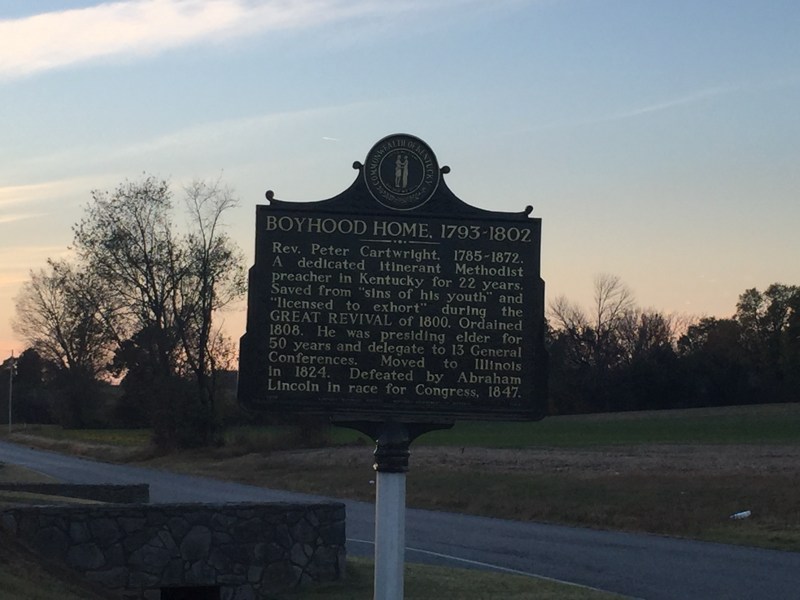
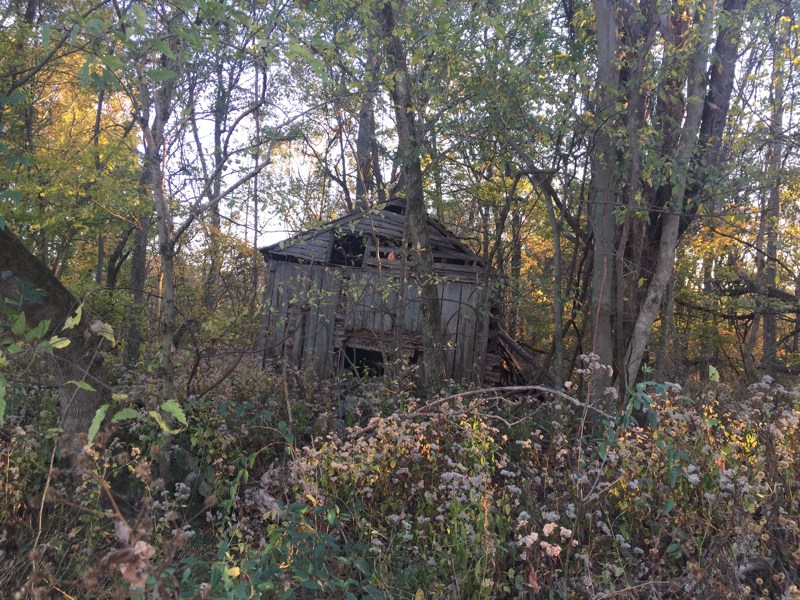
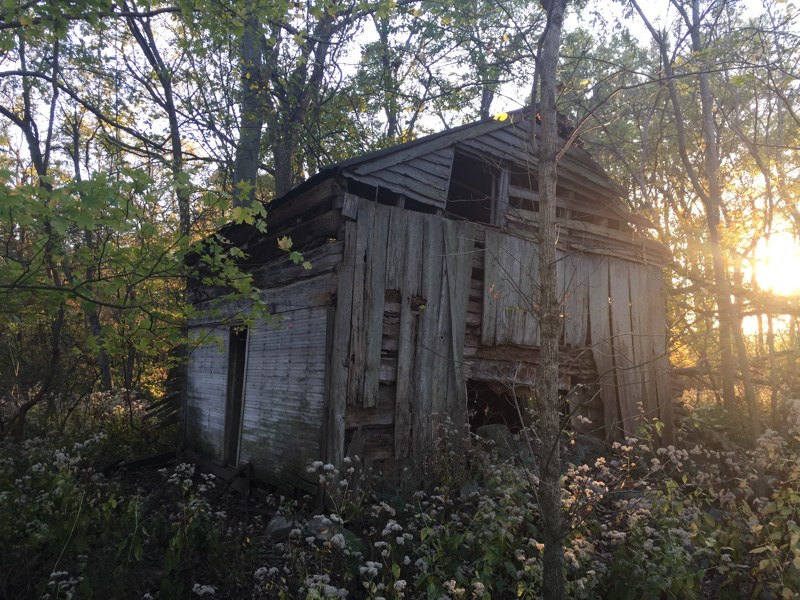
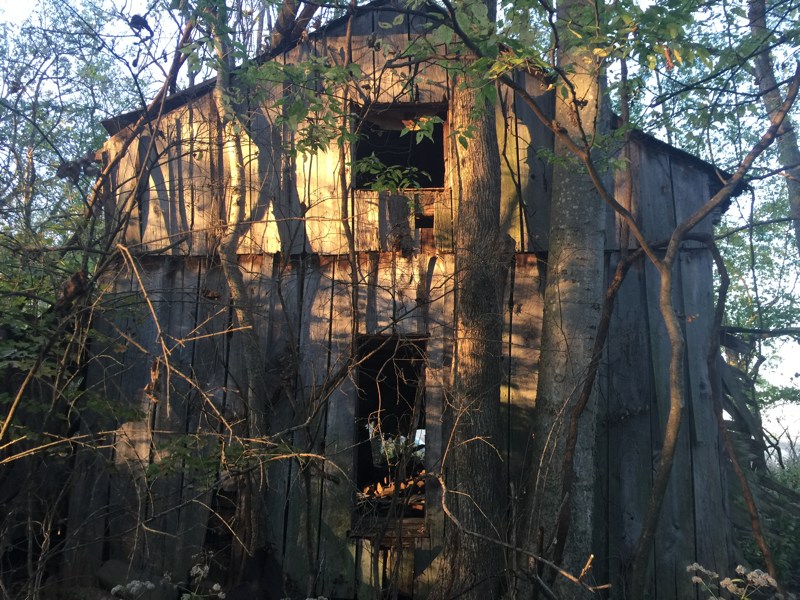
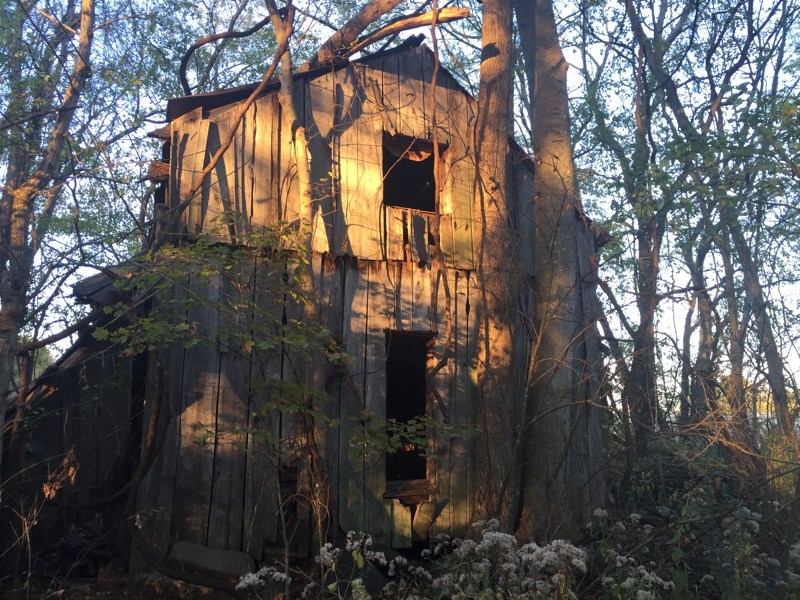
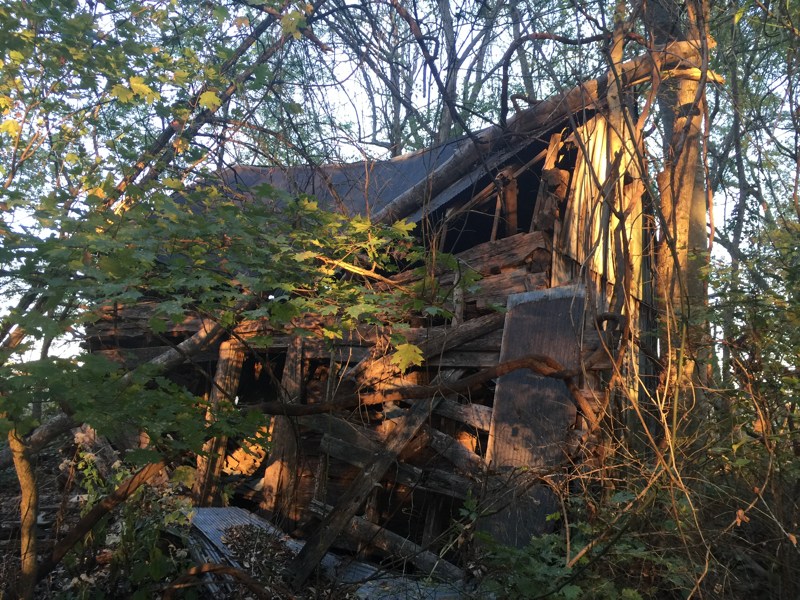
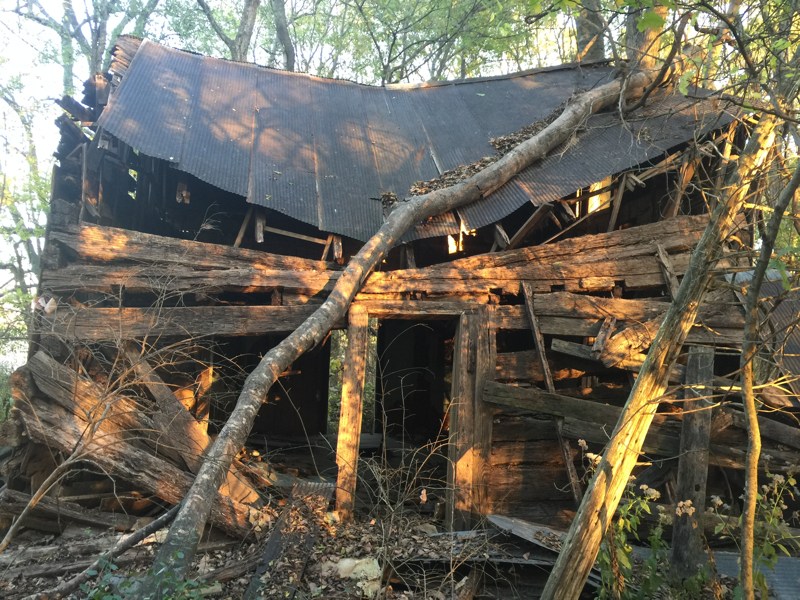
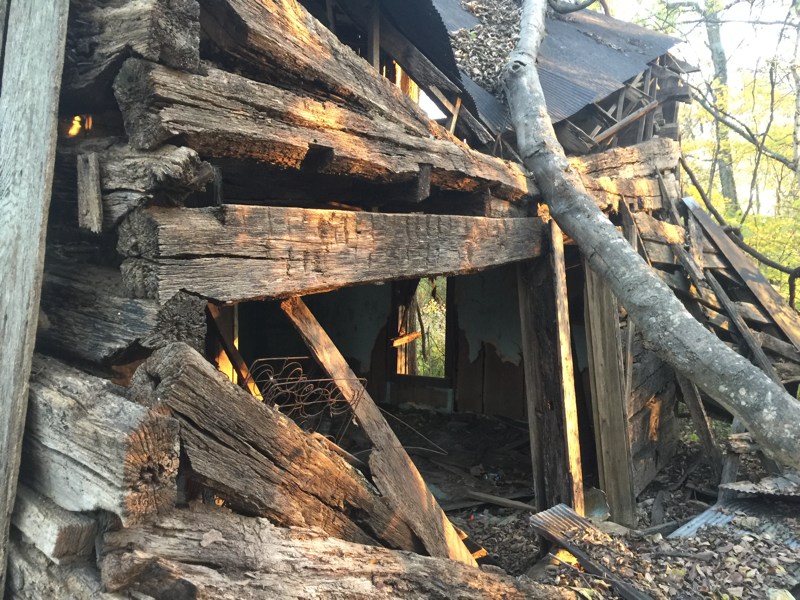
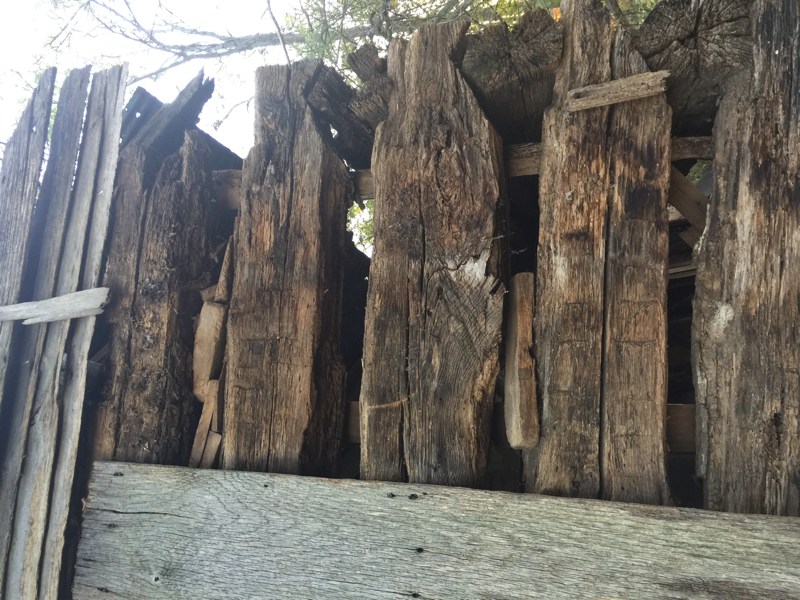
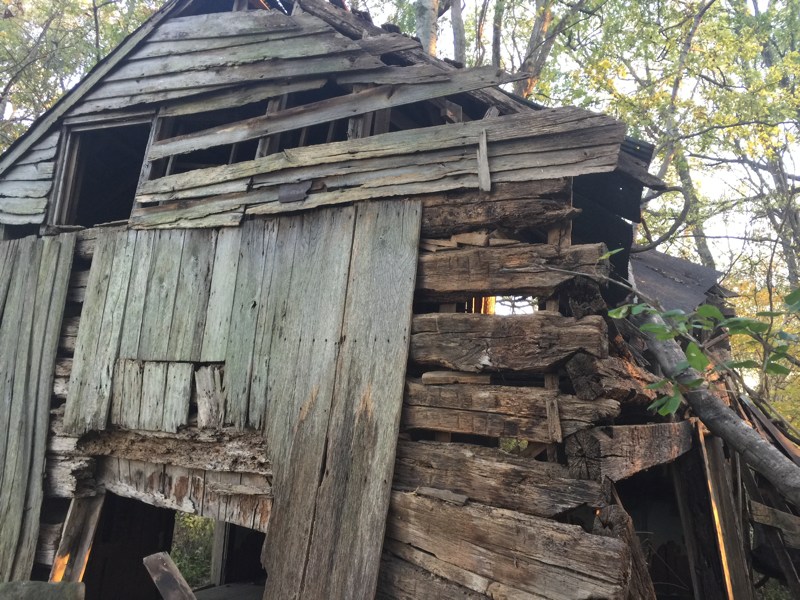
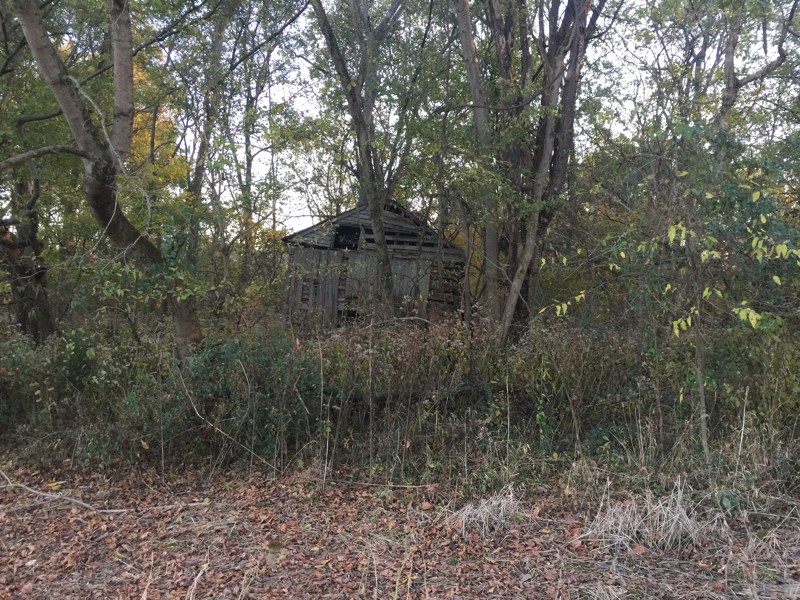
Burial Location
Peter Cartwright is buried in the Pleasant Plains Cemetery, in Pleasant Plains, Sangamon County, Illinois
GPS: 39.868472, -89.920365
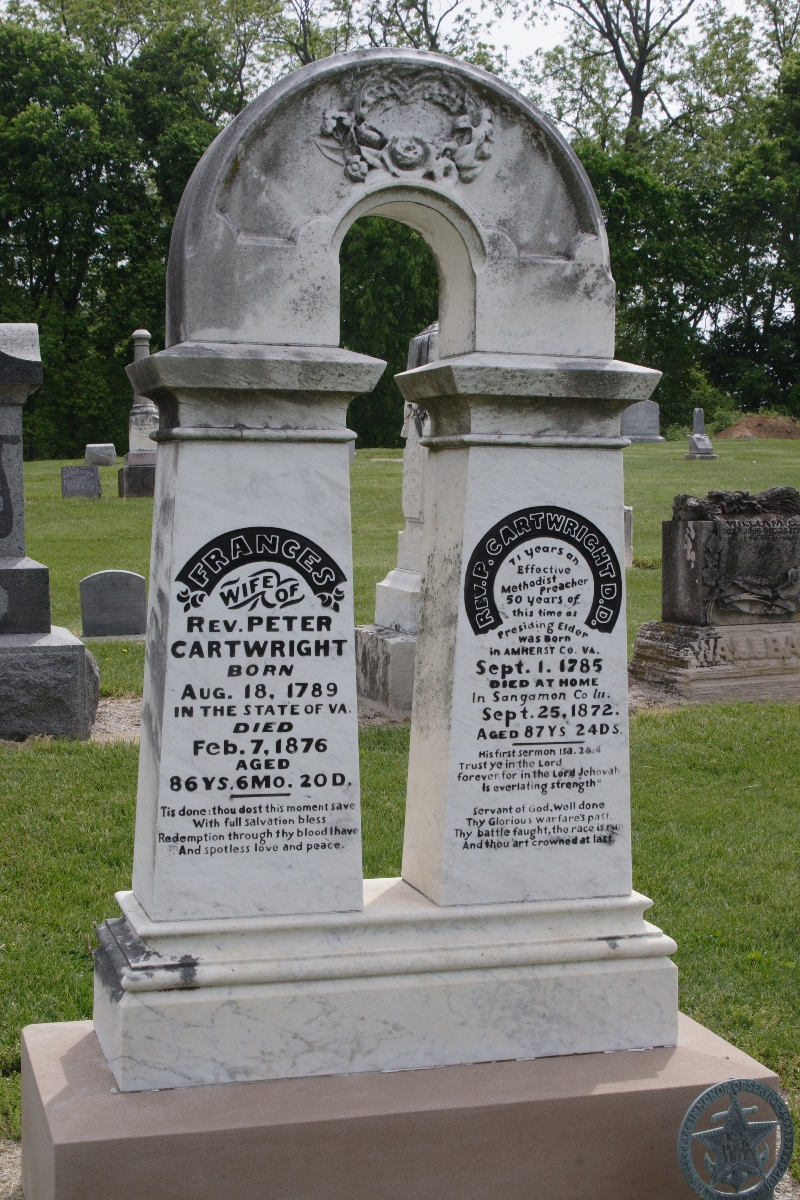
This photo was copied from the wikipedia article on the life of Peter Cartwright. I have not had the privilege of visiting the grave. If you are ever in the region of Sangamon County, Illinois. I would welcome any photos you might like to share of this grave.
![]()
Photos Taken 11.11.2016
Webpage produced 11.12.2016
Courtesy Of Scott Harp
www.TheRestorationMovement.com
Special Recognition: Special thanks goes to local Logan County historian, Evelyn Richardson. One day in October, 2016, Ms. Richardson spent the afternoon taking your webmaster around the county to find the historical locations of the Great Revival. It was a wonderful visit with her. Just hearing her talk about the history of her home area was most enjoyable. We were unable to get to the old house because of the overgrowth on the day we tried to visit the boyhood home of Peter Cartwright. However, the son of one of our church members, Bobby Allen, farms that land around the Cartwright home. Bobby informed me that the field was the best way to get back to the old building, or what's left of it.
![]()
